I tested out the Duolingo Portuguese course for 30 days to see if it’s worth doing.
This Duolingo Portuguese review will go into detail on whether I think it’s worth doing the Duolingo Portuguese course as well as the positives & negatives of the course.
The review is broken up into different sections and I’ve gone into detail on how good Duolingo Portuguese is in teaching you to speak, listen, read and write in Portuguese.
Table of Contents
Summary
Good Things About Duolingo Portuguese
- The course has good quality audio clips for every word and phrase.
- They introduce relevant and useful words and phrases.
- Lots of opportunities to practice what you’ve learnt.
- The course introduces new words while building on concepts you have already learnt.
- Advanced features like stories are a great way to learn natural speech.
- It’s quite fun.
Bad Things About Duolingo Portuguese
- Little speaking practice – the course mainly focuses on reading and writing.
- Sometimes explanations for grammar points can include jargon which can make it difficult to understand.
- No explanation or guidance on the alphabet or pronunciation rules.
- Slow progression.
- Course is too forgiving sometimes leading to bad habits when it comes to writing/spelling.
Would I Recommend Duolingo Portuguese And Who For?
If I personally wanted to learn and become fluent in speaking Portuguese fast, I would not recommend it.
I would however, recommend it for someone who just wants an easy going, free resource to supplement their studies.
If you are doing your own study, I would recommend using the Duolingo Portuguese course as an introduction to the language before progressing on to more in depth resources.
You won’t be able to learn to speak fluent Portuguese from this course alone – that would require a lot of other input such as videos, audio courses, books and more.
This course will teach you some basic words and phrases and will also give you an introduction to Portuguese grammar including verb conjugations.
Alternatives To Duolingo Portuguese
There are many other Portuguese courses out there that will teach you to speak at a fluent level much better than Duolingo.
My top recommendation is Pimsleur, an audio course that will get you speaking from day 1. If you’re serious about learning Portuguese then I’d recommend trying the 7 day FREE trial.
Another great option for learning Portuguese is Glossika. Glossika is also an audio-based course that allows you to acquire grammar and vocabulary through complete sentences (rather than memorizing grammar). You can also try it for free for 7 days.
Background Information
Here’s a bit of background information on myself to give you some context to this review.
I did the Duolingo Portuguese course for 30 days in a row and each day I did about 20 minutes of Duolingo practice. During the 30 days, I did no other Portuguese courses and only learnt Portuguese from the Duolingo course.
Overall this works out to about 10 hours of study in the 30 days.
I’ve never studied Portuguese before doing this course. However I did study Spanish in school which I am sure has given me an advantage in picking up some Portuguese concepts.
It’s important to note that the Duolingo Portuguese course focuses on Brazilian Portuguese rather than European Portuguese.
What Did I Learn In The Duolingo Portuguese Course
Having spent 30 days (20 minutes each day) studying Portuguese with Duolingo, I did learn a fair amount of useful vocabulary, verbs, phrases and grammar points.
So what did I actually learn?
According to Duolingo, I ‘learnt’ 286 words in the 30 days to varying levels of memory. Of course I think it’s fair to say if you tested me on these 286 words I’m sure I would not get 100% correct.
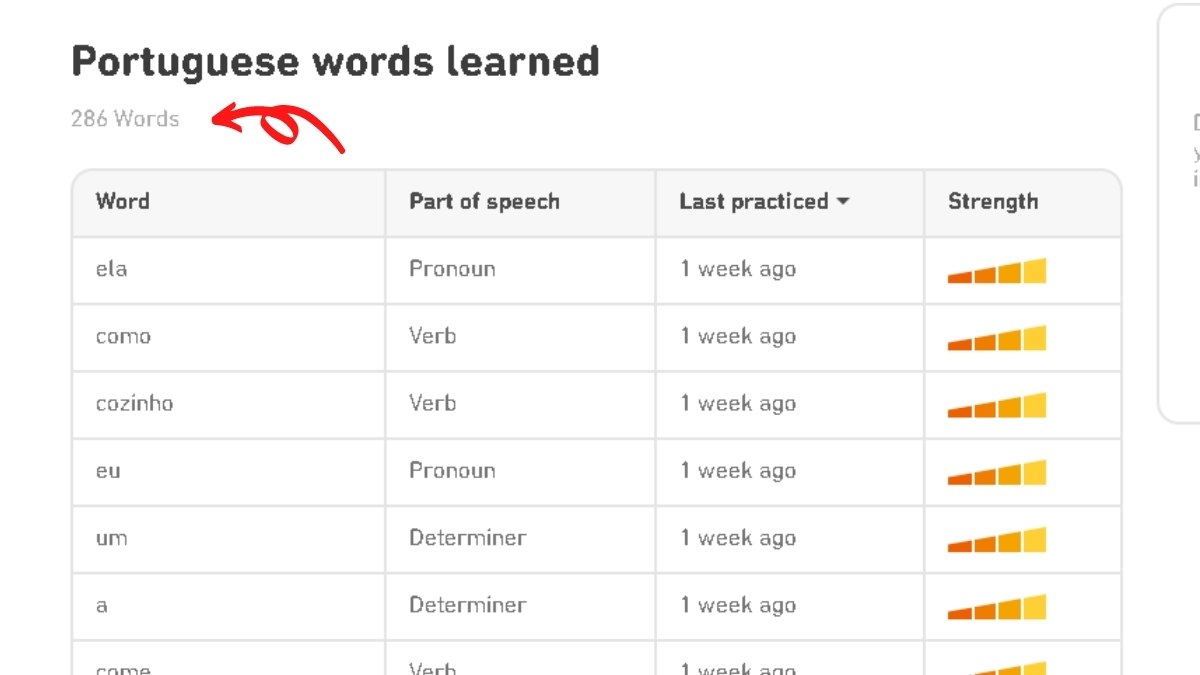
It’s also worth noting that I have come across other new words in the ‘Stories’ section too which do not seem to be included in this vocab total.
For example, the word jogador for ‘player’ is in one of the stories, but it is not on the list of the words learnt.
Duolingo breaks up the language into different topics and each topic will have a different focus. For example, some of the topics I learnt included food, possession, animals, adjectives, plurals, clothing etc. These were just standard topics.
There were also some other more specific topics related to the language. For example, the topic on ‘a gente’ basically revolved around the usage of ‘a gente’, a Portuguese phrase which means ‘we’ or ‘us’.
Below are some examples of words I learnt:
Thank you, please, yes, us, dog, cat, car, who, what, where , rice, no, horse, small, milk, potato, girl, boy, woman, man, you, animals, house, them, theirs, yours, water, fish, newspaper, excuse me,
Below are some examples of verbs I learnt:
To speak, to like, to love, to write, to drink, to wear, to boil, to read, to fry, to need, to eat, to have, to buy
Below are some examples of phrases/sentences that I learnt:
I am a boy, I am sorry, my newspaper, your cat eats fish, our girl writes a book, I speak English, the cat likes milk, they love us, the book talks about women, I do not like her words, they have shirts, do you speak Portuguese?, I need a new video game.
These are just a few examples of words, verbs and sentences that I have come across during my 30 days on Duolingo.
Note* When I say I have ‘learnt’ these words and phrases I mean I have come across them, but not necessarily committed all of them to memory.
Duolingo Features & Teaching Style
Duolingo Portuguese Course
The Duolingo Portuguese course has 4 units with 91 different topics. Each topic contains 5 levels with between 2 and 6 lessons on each level.
You unlock new topics by completing enough levels on the previous lessons.
Tips
Most of the 91 different topics have a ‘tips’ section where you have a bit of extra guidance explaining concepts such as grammar in more detail.
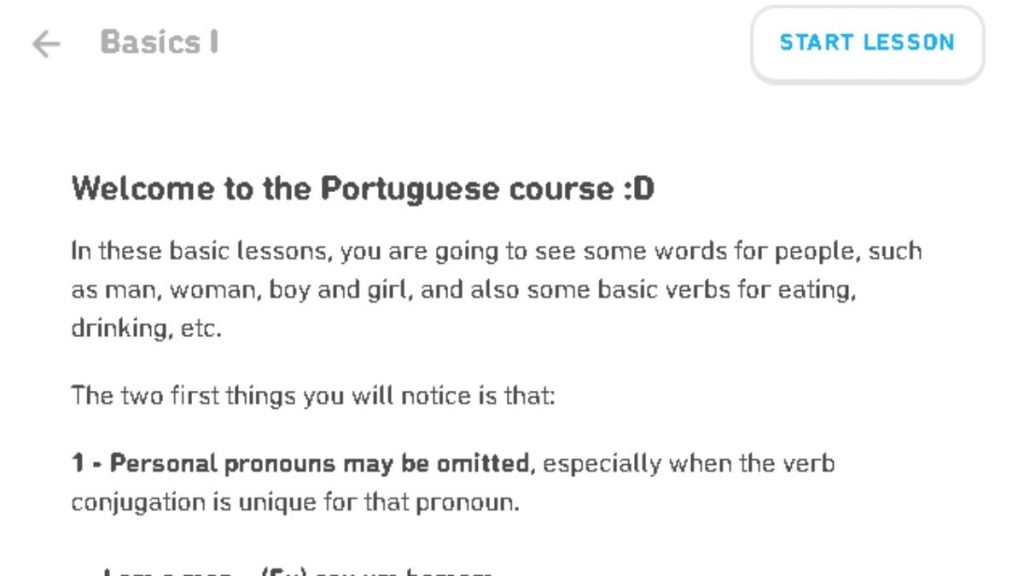
Overall I had mixed feelings about the quality of the ‘tips’ sections.
I found they generally contained a lot of information however they often used jargon that I’m not familiar with e.g. qualifying, declined etc.
Using terms like this may not be very user friendly for a beginner and I wished they’d explained the grammar points in simpler terms.
When I took the time to read, breakdown and look up any unfamiliar words I did actually find the pages to be fairly useful and did help me a lot with improving my understanding of the lessons.
If something just didn’t click in a lesson I would go back and re-read some of the tips and it would make more sense why I was getting things wrong.
It did give examples too to show a new grammar point which was really helpful especially when trying to understand some of the more complex rules involved in Portuguese.
One thing that I think the tips section lacked is guidance on pronunciation, there is no guidance or explanation for how to pronounce the alphabet or how to read correctly and the course kind of relies on you just picking it up from doing the exercises.
While there are some speaking exercises, I didn’t think they were the best for pronunciation.
They could have at least put a basic chart for pronunciation in the first few lessons or even link out to an external resource like the Hungarian Duolingo course does in the first ‘tips’ lessons.
Stories
Stories are a feature of some Duolingo courses where you are given short stories to help your comprehension of the language.
They go through various scenarios that could happen in real life with really good audio clips from native speakers. The stories are quite enjoyable too and really help with comprehension for reading and listening.
Fortunately the Portuguese course does have stories and it ended up being my favourite part of the whole course!
In total, there are currently 180 story lessons in the Portuguese Duolingo course.
The stories each have two levels where the first level is focused on reading and the second level is focused on listening.
In the 30 days that I did the Duolingo Portuguese course, I unlocked 20 stories. You unlock them by getting crowns and you unlock your first stories after getting 10 crowns. You can get crowns by completing levels on different topics.
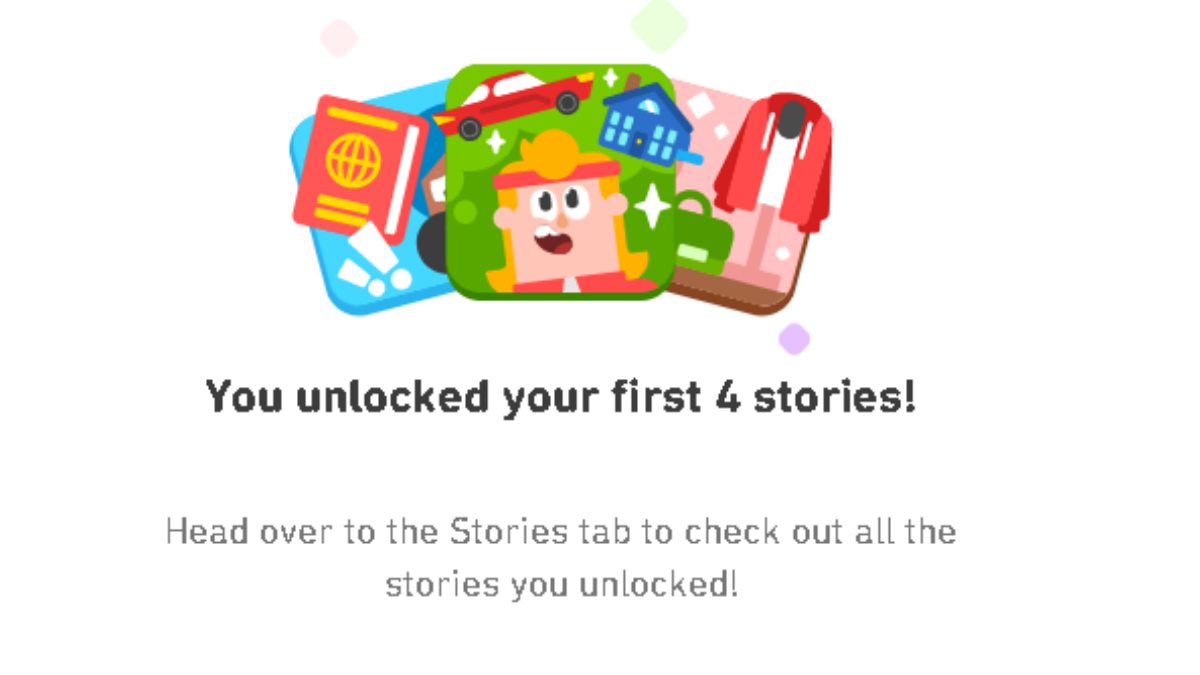
I wished I had access to the stories earlier because like I said, they were my favourite part of the course.
However, you could argue that it is a good thing to restrict access at the start because you need to build up your vocab and fundamentals of the language first.
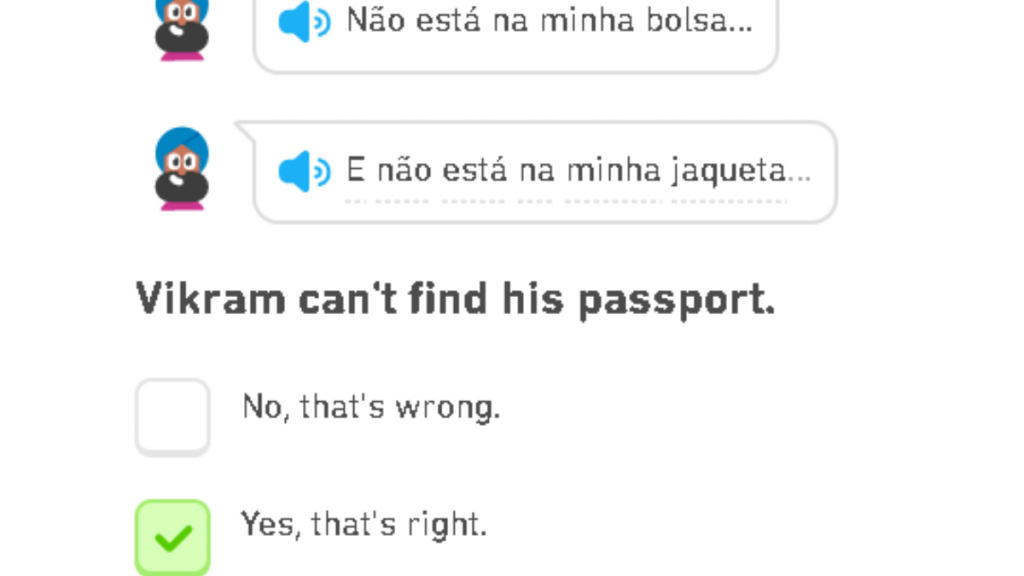
For me the stories may have been easier due to my history in learning Spanish but for a complete beginner who has not done a similar language then it is probably a good thing that you need to ‘earn’ the ability to do the stories.
Podcast/audio lessons
Unfortunately the Duolingo Portuguese course doesn’t currently have any podcasts or audio lessons.
They have introduced this as a feature on some courses, but not on Portuguese yet.
Teaching Style
When doing new lessons on Duolingo they tend to teach you new words/phrases by giving you a few new words often by just asking you to select the correct meaning and showing you a picture to help.
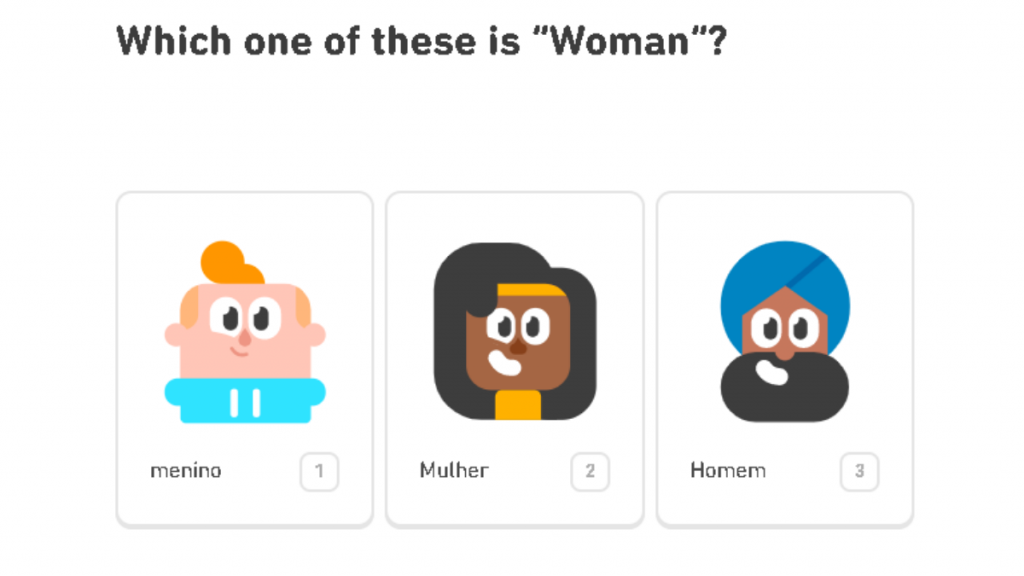
After that you get a range of exercises to practice including translating from English to Portuguese and also from Portuguese to English. Other exercises include listening to words in Portuguese and writing it in either Portuguese or English.
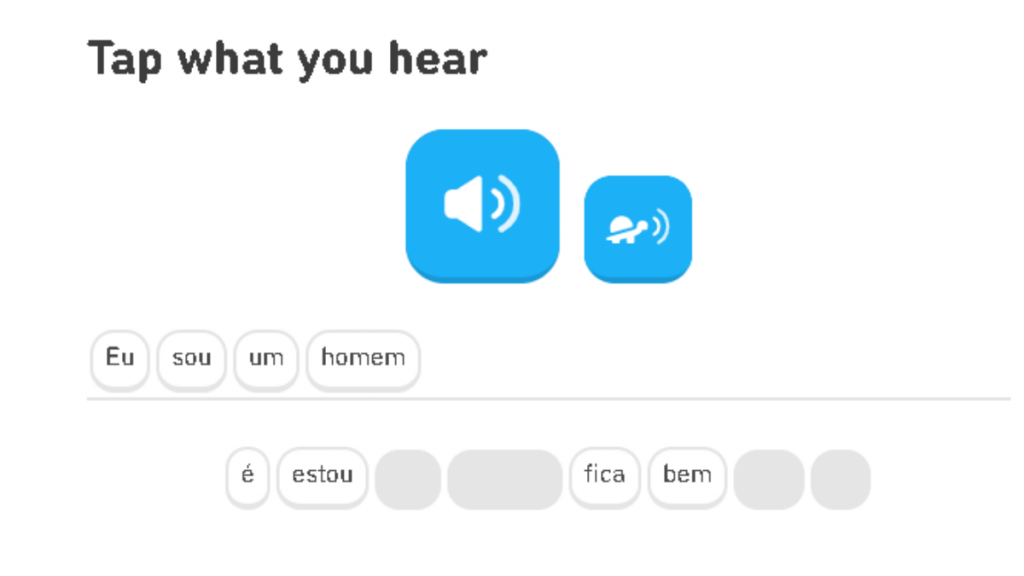
There are also exercises where you are asked to say a sentence or phrase in Portuguese and the voice recognition software assesses whether your pronunciation was correct.
In each new lesson, Duolingo usually introduces a few new words and then uses these words in sentences that you’ve previously learnt in other topics so you can focus on learning the new words.
I found this to be really effective because you can consolidate other things that you’ve learnt and really get to grips with the new words.
This is especially good for concepts that are foreign to you such as verb conjugations.
If there is a word you are unsure of in a sentence you can always hover over it and it will show you the meaning.
New words are also shown in orange so you know straight away if it is something you should know already or if it is something new.
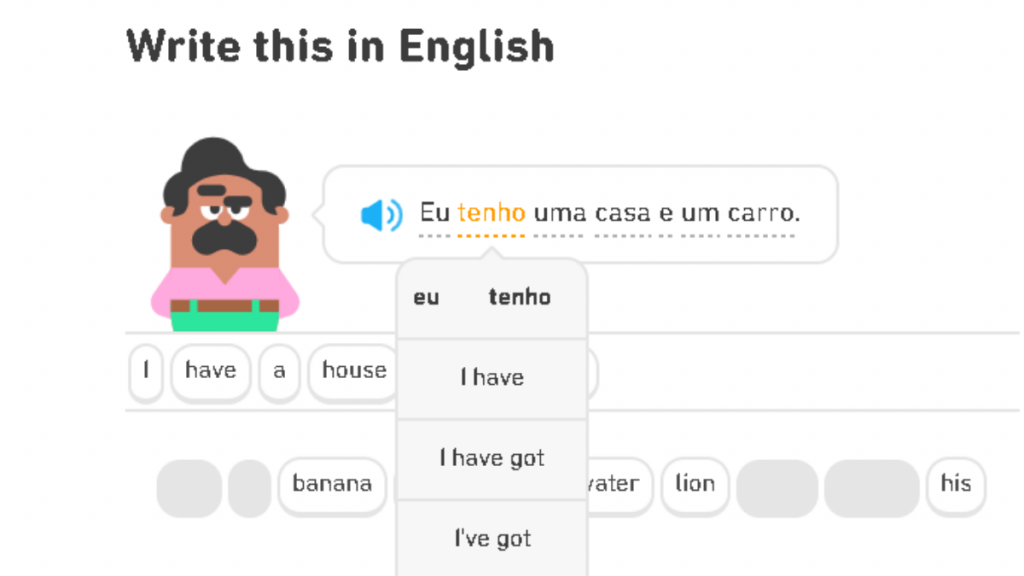
Speaking & Listening
Learning Pronunciation
The Duolingo Portuguese course was ok at teaching pronunciation but it could have been better.
Every single word and sentence included in the course has a sound clip to go with it so you can hear the correct pronunciation of the word/phrase. The audio quality was very good and it sounded like a native speaker.
However there were times where I was wondering whether I am pronouncing the words correctly or not.
There was NO guidance on how to read or pronounce the words in any of the tips sections.
As mentioned earlier I think it would have been very useful to at least have some basic rules on pronunciation rather than just trying to pick it up from doing exercises and hoping that you are mimicking the sound clips correctly.
For example, I had to figure out for myself that the letter ‘t’ in Portuguese can be pronounced as ‘t’ or ‘ch’. I still don’t know the rules around this.
Of course, as you see more words and hear the pronunciation, you pick up on the sounds and then when you see new words with the same letters you pronounce them correctly without hearing them first.
For example, in the word for milk ‘leite’, the ‘t’ is pronounced like a ‘ch’ sound and I picked this up from doing the exercises.
On balance, the high quality audio does tend to make up for the fact that there is little explanation on pronunciation rules.
Voice Recognition
In some Duolingo courses they include voice recognition. This is where a word/phrase will appear on the screen and you have to say the word/phrase out loud into the microphone. Duolingo will then tell you if you pronounced it correctly or not.
Duolingo Portuguese does have these voice recognition exercises and this is a very welcome feature because the thing Duolingo lacks the most is speaking practice.
These exercises force you to say the words out loud, so they test your pronunciation skills.
However, the downside is that I’ve found the exercises to be quite forgiving and you can be marked correctly when pronouncing sentences even if the app thinks you have missed out whole words.
In the screenshot below, I purposefully only said the word for boy ‘menino’ and missed out the word ‘the’ which is ‘O’. You can see that the app has registered the word ‘menino’ (as highlighted in blue) but not the word ‘O’ yet it still marked my answer as correct.
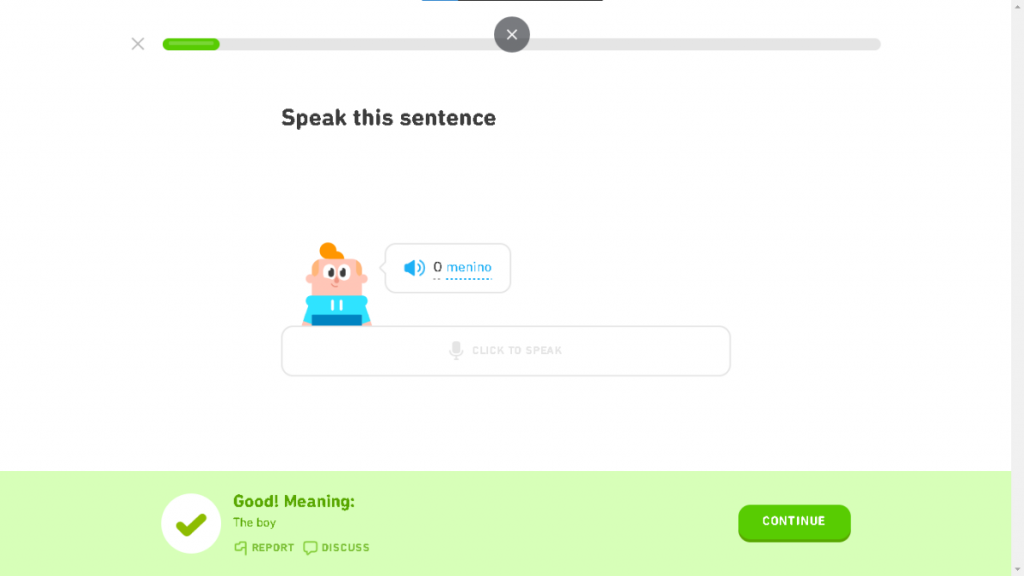
This could lead to bad habits in pronunciation and gives you a false idea of how good your speaking is.
Fluency in Conversation
When you start to learn a language, the main goal is to be able to speak it fluently. After doing the course for 30 days, I wouldn’t be confident at all in speaking with someone in Portuguese.
Of course, after just 30 days there’s no way I would ever be at a fluent level, but I’d even say that after this short time I wouldn’t be confident at all to say much more than some basic greetings and phrases.
One of the main negatives of the Duolingo Portuguese course is that there isn’t much speaking practice. It’s mostly reading and writing.
As mentioned earlier, there are some voice recognition exercises that help somewhat but it’s no way near enough speaking practice to get you to a conversational level.
Even when you do these voice recognition exercises, you are already given the phrase and you just have to read it out.
A good way to increase your speaking practice whilst doing Duolingo is to force yourself to say all the words/phrases out loud as they appear on the screen even if you don’t need to.
The more you say the words, the more they will be consolidated in your brain and they’ll come naturally to you later when you try to use them. Of course this isn’t the best remedy and I’d consider it a negative for Duolingo as it shows that there isn’t a ton of speaking practice.
Due to the lack of speaking practice I find it difficult to recall anything other than the most basic phrases. On the other hand, my recognition of words and phrases is quite good.
Recognition is useful to have for reading and listening, but to produce speech in the language, you need to have strong recall skills, something that I don’t think is developed much in the Duolingo Portuguese course.
If speaking is your main goal then I’d suggest picking a Portuguese course that focuses more on speaking such as Pimsleur or Michel Thomas.
I’ve used Pimsleur courses in the past and they get you speaking from day 1 and only teach you useful phrases that you will actually use.
Michel Thomas is also similar in its focus on speaking right from the start.
Listening Comprehension
Whilst speaking practice was lacking, the listening practice was pretty good. There were plenty of opportunities to practice listening including the listening exercises within the lessons themselves and the stories.
The listening exercises within the standard lessons consisted of an audio clip being played and then you had to try and type what was said.
The stories were especially good for practicing your listening skills as the second level of each story focuses on this.
For example, in the stories they would play some dialogue but not show the words. If you are unable to make sense of it you do have the option to reveal the words if needed.
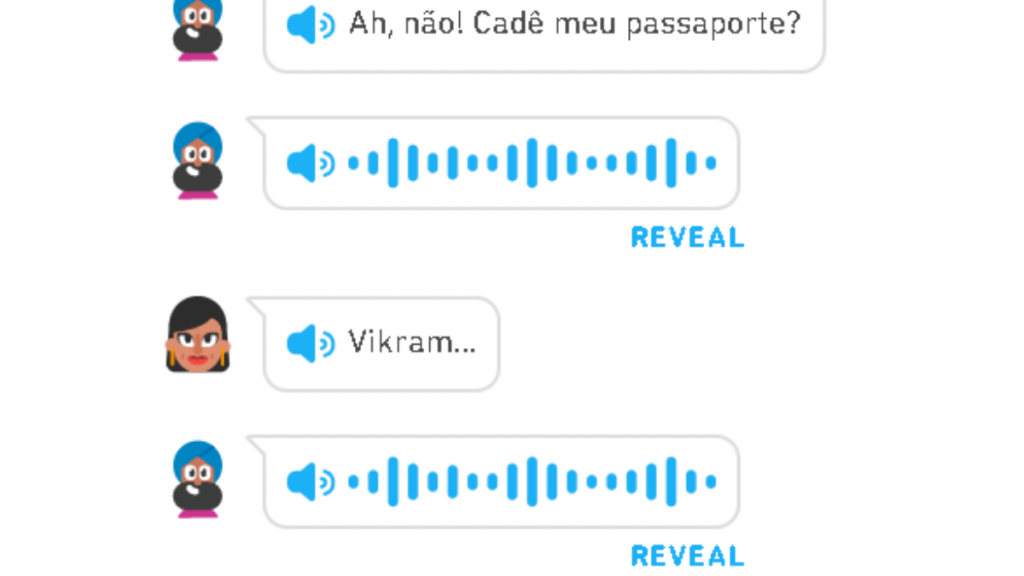
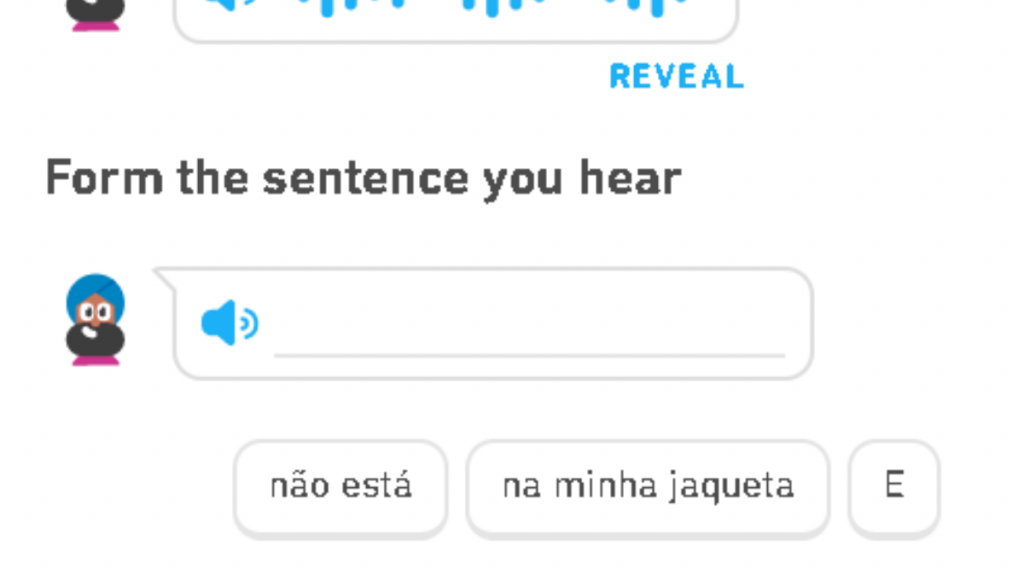
I found these listening exercises to be really effective as we often rely on the words on the screen when listening.
When we read and listen to a sentence at the same time we often think we are good at listening but then when we listen to it on it’s own it can be difficult to understand. This is mainly because we get the understanding from the written words without realizing it.
For example, many people find that when watching a video/TV show in their target language with subtitles they can understand what is being said, however when they watch the same video/TV show without subtitles they struggle to understand it at all.
For this reason, I think the listening exercises are essential and I found them to be very beneficial to learning.
I don’t think you can successfully learn to listen to and comprehend Portuguese without this sort of practice.
Reading & Writing
Learning To Read The Script
The Portuguese language uses the Latin script which makes it fairly simple for English speakers to learn. All the letters are familiar, but you will just have to get used to pronouncing certain letters differently.
Whilst it is quite simple, there was definitely a lack of any explanation on the pronunciation of certain letters in Portuguese and there were some clear differences compared with English.
You can’t just read words in Portuguese as you would in English as the pronunciation would be wrong.
To learn to read the script, there should have been an introduction or at least a link to an external resource so that you can start your learning with the right reading and pronunciation habits.
Writing In Portuguese
When it comes to writing in Portuguese, I have mixed feelings about this.
As a native English speaker who hasn’t learnt Portuguese before, I found remembering the spellings of words to be easy however spelling them accurately and with the correct accents was much harder.
This is partly because Duolingo doesn’t make much effort in forcing you to learn the accents.
For example, in the writing/typing exercises where you have to type the phrases in Portuguese, the app will accept answers with typos and missed accents.
Whilst this helps in making the learning process smoother, it definitely can lead to bad habits and learners not really caring for the correct spelling.
You might be going through these exercises thinking you’re doing well, but you might just be teaching yourself how to spell things incorrectly!
In the example below the correct answer is ‘és’ but Duolingo has accepted ‘es’ as correct.
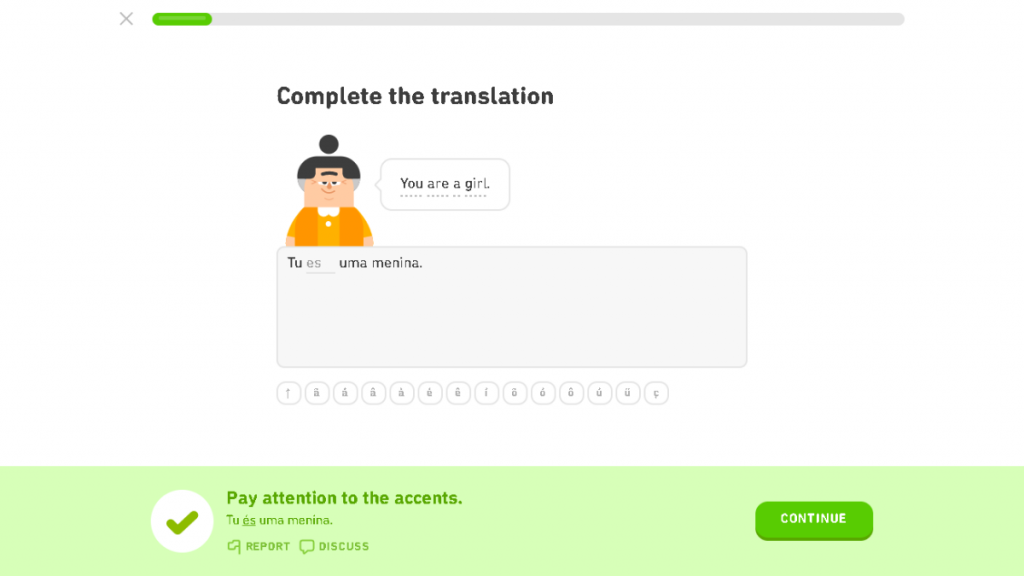
Of course you are only practicing typing with Duolingo and not actually writing with a pen. If you want to physically practice handwriting then you will have to do that in your own time.
Verb Tenses Covered
Tenses are super important when it comes to learning a new language. After completing 30 days of the Duolingo Portuguese course, I have only used the present tense.
Having said this, I can see that topics later in the course do introduce other tenses so you’d have to do the course for longer to learn this.
Although I would have liked to have learnt some other tenses, the course so far did focus a lot on developing other parts of the language.
For example, it did go through lots of variations of the verb conjugations so you were able to have plenty of practice saying the different forms.
For example, different variations such as I eat, you eat, they eat, we eat etc.
As this is a foreign concept to English speakers, I think it was a good thing that Duolingo didn’t overload us with different tenses as well because the different verb conjugations can be hard enough on their own.
I think Duolingo did a reasonable job in teaching these different verb conjugations and introduced them at a pace that allowed you to consolidate your learning with lots of examples.
Vocabulary Building And Relevancy
Overall I was happy with the vocabulary that Duolingo taught. Most of the vocabulary that was introduced to me was relevant and useful.
The first few lessons taught us words like boy, girl, man, woman, bread, milk.
After that each topic tended to focus on a particular vocabulary type e.g. there was a food topic that introduced lots of words like cheese, apple, tea, bread etc.
I found that overall the words and phrases taught were relevant and pretty standard for a beginner.
Memory/SRS
Being able to remember and recall words and phrases in Portuguese is one of the most important things for a language learner.
Overall I found that the Duolingo course is better at developing recognition skills than it is in developing recall skills. E.g. I can easily recognise certain words in writing but may struggle to recall them from memory and say them.
I’d say I’m much better at reading Portuguese than writing/speaking as my recall isn’t as good as my recognition so it would have been good if Duolingo focused on this a bit more.
I also found that you have to have a plan on how you’re going to review older lessons so you don’t forget words that you’ve already learnt. You decide how much you learn before moving onto the next topic and you also decide when you want to review older content.
This can be difficult for a new language learner because after a while there’s tons of older topics that need reviewing and I can’t always remember when I last reviewed a particular topic and when’s the best time to review it again.
SRS or a spaced repetition system is best for this. While Duolingo does claim to use SRS I didn’t see any evidence of this while doing the course.
For example, there was no clear reminder to say ‘hey you need to go back and do this lesson’.
SRS is a method where a learner is asked to remember a certain word/phrase with the time intervals increasing each time the word is presented.
Some of the best SRS software include free resources like Anki and paid resources like Glossika.
I think the Duolingo Portuguese course could be improved by incorporating a more structured review process to ensure you don’t forget anything you learnt in previous lessons.
Was It Fun?
One of the main positives of using something like Duolingo to learn a new language is that it is a gamified course.
They have lots of incentives that help you to come back everyday and do a few lessons.
These include the streak, where you build up a streak everyday that you do Duolingo. They also have leader boards where you compete against other people to build points and finish top of your league.
I found the actual course and content to be quite enjoyable, it’s not boring like reading a grammar textbook.
I could definitely see this as something you can do everyday with ease – it’s almost addictive!
Overall Progression
I have mixed feelings about the progress I made doing 30 days of Portuguese on Duolingo.
This is from the point of view of someone who puts an emphasis on being able to speak the language.
In terms of my speaking ability, I am not happy with my progress. In terms of understanding basic concepts and learning some basic vocab, I’m quite satisfied.
Like I said before, I could barely put together anything more than a basic phrase when it comes to speaking.
There are other courses that will get you feeling much more confident speaking in the same amount of time.
As an introduction to the course for a beginner, I think Duolingo does a good job of introducing some basic words, verbs, phrases and concepts.
It’s also decent for developing recognition of words.
As mentioned before, my recognition skills (listening and reading ) are probably a lot better than my recall skills (writing and speaking).
If your main goal is to be able to speak then you’d be better with an audio course like Pimsleur.
Pimsleur gets you speaking from day 1 and has tons of content to build up your confidence and speaking level. If you’re serious about learning Portuguese then I’d recommend doing the free trial for Pimsleur.
Can You Actually Learn The Portuguese Language With Duolingo?
If you want to become fluent in Portuguese then you won’t be able to do this with Duolingo alone.
Becoming fully fluent will require lots of different inputs including videos, books, audio lessons and much more.
Duolingo alone won’t get you there but as I said before it is a great introduction to the language and an easy way to get some daily practice as a supplementary resource.
Is Duolingo Portuguese Worth It Or Is It A Waste Of Time?
If you want a free resource and don’t want to think about making your own study plan then Duolingo is a good option.
It’s also a good way to test if you even want to learn the language. This is because Duolingo is probably one of the more ‘fun’ ways to learn a language.
If you can’t do Duolingo for a few days then you’d probably struggle with more serious studying.
Duolingo is a good introductory resource and a decent supplementary resource for some daily practice.
However, if you really want to get fluent at speaking fast then it is a bit of a waste of your time and you’d be better off putting your time into more efficient study.
Alternatives
There’s plenty of alternatives to Duolingo if you’re wanting to learn Portuguese fluently.
Pimsleur
My top recommendation is Pimsleur. This audio course will get you speaking from day 1 and has tons of content to build up your confidence and speaking level. If you’re serious about learning Portuguese then I’d recommend doing the 7 day free trial to try out Pimsleur Portuguese.
The great thing about Pimsleur is that they actually have separate courses for European Portuguese and Brazilian Portuguese so you can choose to focus on one.
Glossika
Another fantastic option for learning Portuguese is Glossika. They help you to speak a new language quickly with their clever algorithms.
Glossika is also an audio-based course which I think is essential if you want to be a fluent speaker of Portuguese. Glossika allows you to acquire grammar and vocabulary through complete sentences (rather than memorizing grammar).
PortuguesePod101
Finally, PortuguesePod101 is another decent resource for someone looking to learn Portuguese fluently.
They feature both audio and video lessons recorded by Portuguese teachers who will explain everything to you in simple terms. They also have word lists and flashcards to help you study.
If you’re on a budget then PortuguesePod101 has a great YouTube channel that covers lots of content and it’s free.
Check out one of their most popular videos below:
Thanks for reading this Duolingo Portuguese review.
I spent 30 days testing out the Duolingo Portuguese course to find out if it’s worth it.
If you’re interested in learning more Portuguese then check out how to say I love you in Portuguese or how to say happy birthday in Portuguese.
Related Posts:
